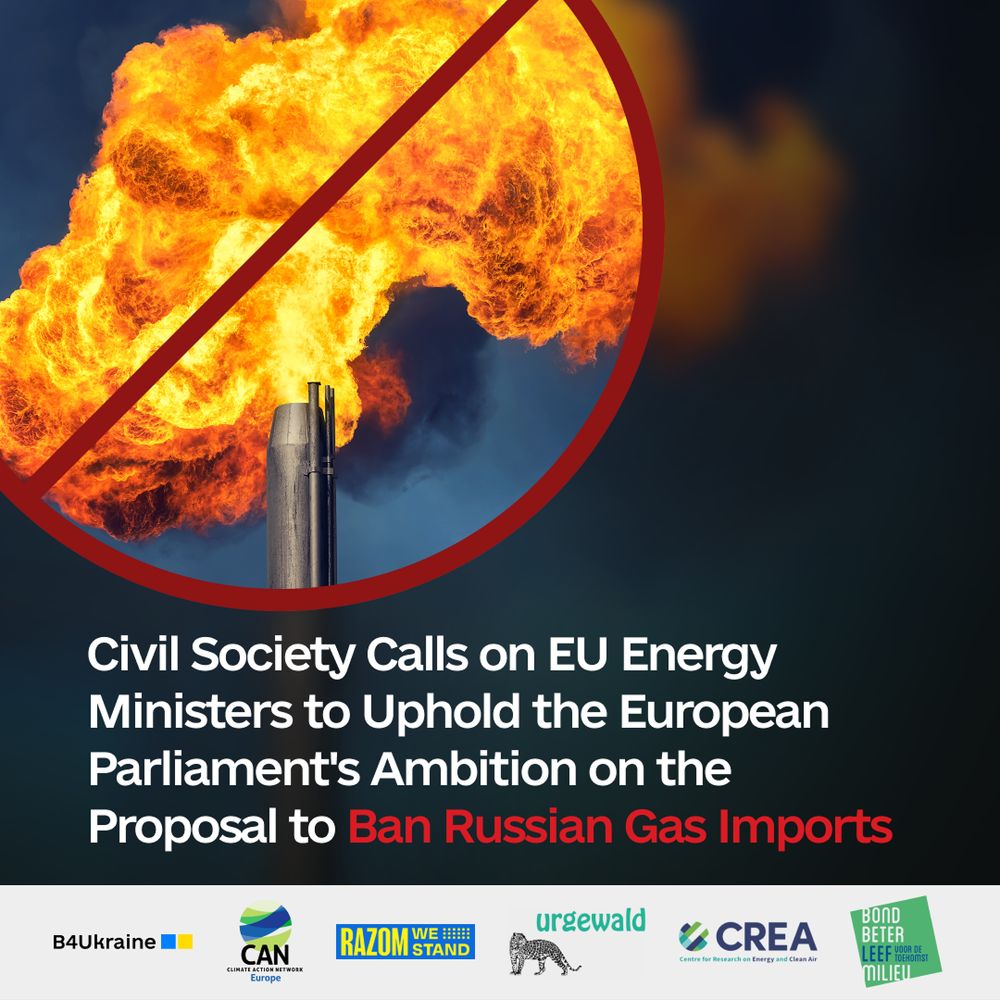
Joint Statement
Civil society calls on EU energy ministers, ahead of the Energy Council’s meeting, to uphold the European Parliament’s ambition on the proposal to ban Russian gas imports
As the EU negotiates the proposed Regulation to ban imports of Russian gas at the Energy Council on Monday, October 20, our coalition of civil society organisations calls on Member States to uphold the ambition of the European Parliament’s proposal and close the loopholes that they introduced in the Council’s draft general approach.
The European Commission’s proposed Regulation represented a good starting point toward ending the EU’s dependence on Russian fossil fuels and closing a major channel of revenue sustaining Russia’s war against Ukraine, although it was missing more ambition in places.
The European Parliament’s position adopted on Thursday 16th October, addresses this by:
• extending the import ban to Russian oil,
• accelerating the Regulation’s timeline, and
• removing potential loopholes such as the security of supply suspension clause.
Changes introduced by Member States have created dangerous loopholes, legal uncertainty, and delays that would prolong Europe’s reliance on Russian energy and undermine the EU’s energy security and credibility.
These measures are not only necessary to uphold the EU’s climate and energy security objectives, they are also essential to weaken Russia’s war economy. A recent analysis from Razom We Stand has shown that the EU could drain billions of euros (an additional €29 billion in cumulative losses) from the Kremlin’s war chest over the next two years if the final agreement that is reached on the EU’s proposed gas ban is closer to the position of the European Parliament than to that of member countries.
We urge EU Energy Ministers meeting next Monday to stand firm on five core priorities:
1. Close the loopholes: keep clear, enforceable deadlines
The Council’s longer transition periods and exemptions for landlocked countries must be rejected. The EU should ban short-term gas contracts by 1 January 2026, in line with the REPowerEU roadmap, and all long-term imports by 1 January 2027 as the European Parliament suggests.
2. Delete the “security of supply” suspension clause
Allowing a temporary return to Russian gas under Article 15 would fatally weaken the Regulation and contradict the EU’s own lessons from the energy crisis. Security does not come from toxic dependence on Russian fossil fuels.
3. Require robust National Diversification Plans
Every Member State must present a transparent, time-bound plan aligned with their National Energy and Climate Plans (NECPs), focused on energy efficiency, gas demand reduction and renewables, not new fossil energy dependencies and infrastructure. These national plans should be publicly available documents.
4. Guarantee full traceability of gas imports
Introduce certificates of ultimate origin to stop the high risk of “whitewashing” of Russian gas when it passes through a third country and include all gas entry points such as Strandzha 1 between Turkey and Bulgaria as well as Kipoi between Turkey and Greece.
5. Strengthen the scope and enforcement of the ban
• Extend the Regulation to cover Russian oil by 1 January 2026, to also ensure a ban on the importation of Russian petrochemicals and oil products from refineries that import Russian crude oil and oil products that are further processed and exported to the EU (a case study can be seen here).
• Prohibit EU companies from reselling Russian gas outside the EU.
• Permanently end LNG services for Russian entities and gas, to enact in the Regulation a permanent transhipment ban.
• Ban EU financial institutions from facilitating payments linked to Russian fossil fuels.
The EU has a moral, strategic, and legal responsibility to ensure that no euro more fuels Russia’s war machine. We call on all EU Energy Ministers and national governments to defend a strong, loophole-free Regulation that finally ends Europe’s fossil dependence on Russia and delivers on the promise of REPowerEU: freedom from fossil fuels and freedom from aggression.
Signed by:
Climate Action Network (CAN) Europe
Razom We Stand
B4Ukraine
Urgewald
Centre for Research on Energy and Clean Air (CREA)
Bond Beter Leefmilieu